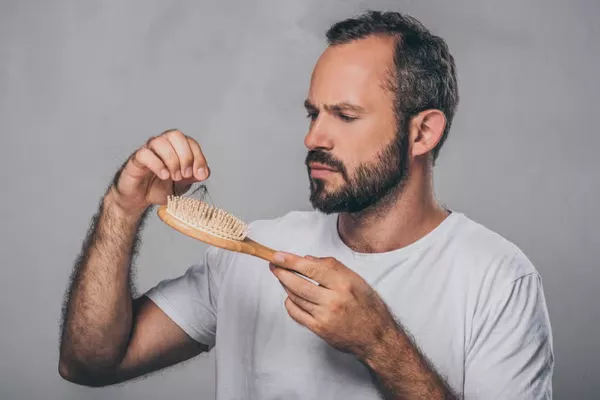Hair loss is a common concern for men, and while various factors can contribute to this issue, hormonal imbalance is one of the significant underlying causes. Hormones play a crucial role in regulating various bodily functions, including hair growth and maintenance. When there is a disruption in the hormonal balance, it can lead to significant changes in the hair growth cycle, resulting in hair thinning and eventual loss. Understanding the intricate relationship between hormonal imbalance and hair loss is essential for effectively addressing this issue. Here, we delve into the mechanisms behind hormonal imbalance and its contribution to hair loss in men.
1. Testosterone and Dihydrotestosterone (DHT):
Testosterone is a key hormone in men that contributes to the development of male reproductive tissues and secondary sexual characteristics. However, when testosterone is converted to dihydrotestosterone (DHT) by the enzyme 5-alpha-reductase, it can have a detrimental effect on hair follicles. DHT binds to the receptors in the scalp’s hair follicles, causing them to shrink and become less capable of supporting healthy hair growth. This process, known as miniaturization, leads to the gradual thinning and eventual loss of hair.
2. Thyroid Hormones and Hair Growth:
Thyroid hormones, including thyroxine (T4) and triiodothyronine (T3), play a crucial role in regulating the body’s metabolism and growth. When there is an imbalance in thyroid hormone levels, it can disrupt the normal hair growth cycle, leading to excessive hair shedding and thinning. Hypothyroidism, characterized by an underactive thyroid gland, can result in dry, brittle hair, while hyperthyroidism, characterized by an overactive thyroid gland, can cause hair to become fine and fragile.
3. Cortisol and Stress-Induced Hair Loss:
Cortisol, commonly known as the stress hormone, is produced by the adrenal glands in response to stress and anxiety. Elevated levels of cortisol can disrupt the normal functioning of the hair follicles, leading to a condition known as telogen effluvium. This condition causes the hair follicles to enter a resting phase prematurely, resulting in excessive hair shedding and thinning. Chronic stress and prolonged periods of elevated cortisol levels can contribute to persistent hair loss and a noticeable decrease in hair density.
4. Insulin and Androgen Excess:
Insulin, a hormone produced by the pancreas, plays a crucial role in regulating blood sugar levels. However, when there is an excess of insulin in the body, it can lead to an increase in androgen production. Elevated androgen levels can contribute to the development of androgenetic alopecia, also known as male pattern baldness. This condition is characterized by the gradual thinning of hair on the crown and temples, eventually leading to partial or complete hair loss in affected individuals.
5. Growth Hormone and Hair Regeneration:
Growth hormone is responsible for stimulating cell growth and regeneration throughout the body, including the hair follicles. When there is a deficiency in growth hormone levels, it can negatively impact the hair growth cycle, leading to decreased hair density and slower hair regrowth. A deficiency in growth hormone can contribute to the development of thinning hair and an overall decrease in the quality of hair in men.
6. Androgen Receptor Sensitivity:
Apart from the levels of specific hormones, the sensitivity of androgen receptors in the scalp also plays a crucial role in determining the severity of hair loss. Some individuals may have a genetic predisposition to have more sensitive androgen receptors, making them more susceptible to the effects of hormonal imbalances on hair follicles. This increased sensitivity can lead to the accelerated miniaturization of hair follicles and a more rapid progression of hair loss.
Understanding the complex interplay between hormones and hair loss is crucial for effectively addressing this issue and developing appropriate treatment strategies. Identifying the underlying hormonal imbalances through comprehensive hormone testing can help determine the most suitable treatment approach for individuals experiencing hair loss. Additionally, adopting a holistic approach that includes stress management, dietary adjustments, and lifestyle modifications can help restore hormonal balance and promote healthy hair growth.
FAQs About Male Hair Loss:
Q1: Can hormonal imbalance cause sudden and severe hair loss in men?
A: Yes, hormonal imbalance can contribute to sudden and severe hair loss in men, particularly in cases of conditions such as androgenetic alopecia or telogen effluvium. It is essential to identify the underlying hormonal imbalances through comprehensive testing and consult with a healthcare professional to determine the most appropriate treatment approach.
Q2: Can hair loss due to hormonal imbalance be reversed?
A: Depending on the specific hormonal imbalances and the underlying causes of hair loss, certain treatments and interventions can help manage and, in some cases, reverse the effects of hormonal imbalance on hair growth. These treatments may include hormone replacement therapy, lifestyle modifications, and dietary adjustments to restore hormonal balance and promote healthy hair growth.
Q3: How can stress management help prevent hormone-induced hair loss in men?
A: Stress management techniques, such as mindfulness meditation, yoga, and regular exercise, can help reduce cortisol levels and mitigate the effects of stress-induced hair loss. By managing stress effectively, individuals can promote hormonal balance and support healthy hair growth.
Q4: Are there specific dietary changes that can help balance hormones and promote healthy hair growth?
A: Yes, incorporating a balanced diet rich in essential nutrients, including vitamins, minerals, and proteins, can help support hormonal balance and promote healthy hair growth. Foods such as leafy greens, fruits, lean proteins, and whole grains can provide the necessary nutrients for maintaining strong and healthy hair.
Q5: What role do lifestyle modifications play in managing hormone-induced hair loss in men?
A: Lifestyle modifications, such as maintaining a regular exercise routine, getting an adequate amount of sleep, and avoiding excessive alcohol consumption and smoking, can help support hormonal balance and promote healthy hair growth. Adopting a healthy lifestyle can contribute to overall well-being and help mitigate the effects of hormonal imbalances on hair loss.

